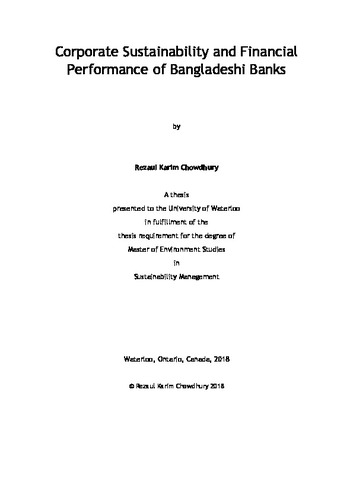UWSpace will be migrating to a new version of its software from July 29th to August 1st. UWSpace will be offline for all UW community members during this time.
Corporate Sustainability and Financial Performance of Bangladeshi Banks
| dc.contributor.author | Chowdhury, Rezaul Karim | |
| dc.date.accessioned | 2018-12-07 15:13:36 (GMT) | |
| dc.date.available | 2018-12-07 15:13:36 (GMT) | |
| dc.date.issued | 2018-12-07 | |
| dc.date.submitted | 2018-12-05 | |
| dc.identifier.uri | http://hdl.handle.net/10012/14208 | |
| dc.description.abstract | Purpose- This study analyzes the connection between the sustainability performance and financial performance of Bangladeshi banks to ascertain whether the implementation of sustainability regulations has an impact on financial performance. Furthermore, if an impact is found, whether it increases or decreases the financial performance of these banks. Design/Methodology/Approach- This study evaluates financial and sustainability related performance indicators taken from published Central Bank reports as well as from respective banks’ published annual reports and websites. The indicators have been analyzed using several statistical methods, such as Linear Regression, Panel Regression, and Granger causality tests. Practical Implications- Porter and Linde (1995) claimed that improving a firm’s environmental performance can lead to better financial performance, without an increase to cost. By following this approach, Bangladeshi banks can make more profit on the one hand and save the environment on the other by investing more in green products and projects. Social Implications- Bangladeshi banks will be able to influence and motivate businesses to become greener, which will reflect on society and on the total economy. As a result, the country will be able to lower the pollution rate and better handle other natural calamities that hinder the everyday life of the people and of society overall. Research Limitations- Since this is a new concept for Bangladesh, with regulations having been introduced only six years ago, the field is currently going through the early development phase. Hence, very little research has been done on this topic. Moreover, the data related to green performance indicators are not consistent throughout the years of implementation due to limited reporting, which limits the set of available data on hand. More data is needed to analyze the long-term effects of the regulations. Originality/Value– To the best of the author’s knowledge, this is the first study that explores the sustainability performance of Bangladeshi banks, including their product and services. Furthermore, the study adds to the knowledge regarding the impact of financial sector regulations and policies on the environmental and financial performance of banks. Keywords: Banks; Bangladesh; credit risk; green banking; Environmental & Social Risk Management (ESRM); corporate sustainability; guidelines. Paper Type– Research paper | en |
| dc.language.iso | en | en |
| dc.publisher | University of Waterloo | en |
| dc.subject | Bangladesh | en |
| dc.subject | Bank | en |
| dc.subject | Credit Risk | en |
| dc.subject | Green Banking | en |
| dc.subject | Environmental & Social Risk Management (ESRM) | en |
| dc.subject | Corporate Sustainability | en |
| dc.subject | Guidelines | en |
| dc.subject.lcsh | economic development projects | en |
| dc.subject.lcsh | bonds | en |
| dc.subject.lcsh | developing countries | en |
| dc.subject.lcsh | sustainable development | en |
| dc.title | Corporate Sustainability and Financial Performance of Bangladeshi Banks | en |
| dc.type | Master Thesis | en |
| dc.pending | false | |
| uws-etd.degree.department | School of Environment, Enterprise and Development | en |
| uws-etd.degree.discipline | Sustainability Management | en |
| uws-etd.degree.grantor | University of Waterloo | en |
| uws-etd.degree | Master of Environmental Studies | en |
| uws.contributor.advisor | Weber, Olaf | |
| uws.contributor.affiliation1 | Faculty of Environment | en |
| uws.published.city | Waterloo | en |
| uws.published.country | Canada | en |
| uws.published.province | Ontario | en |
| uws.typeOfResource | Text | en |
| uws.peerReviewStatus | Unreviewed | en |
| uws.scholarLevel | Graduate | en |

